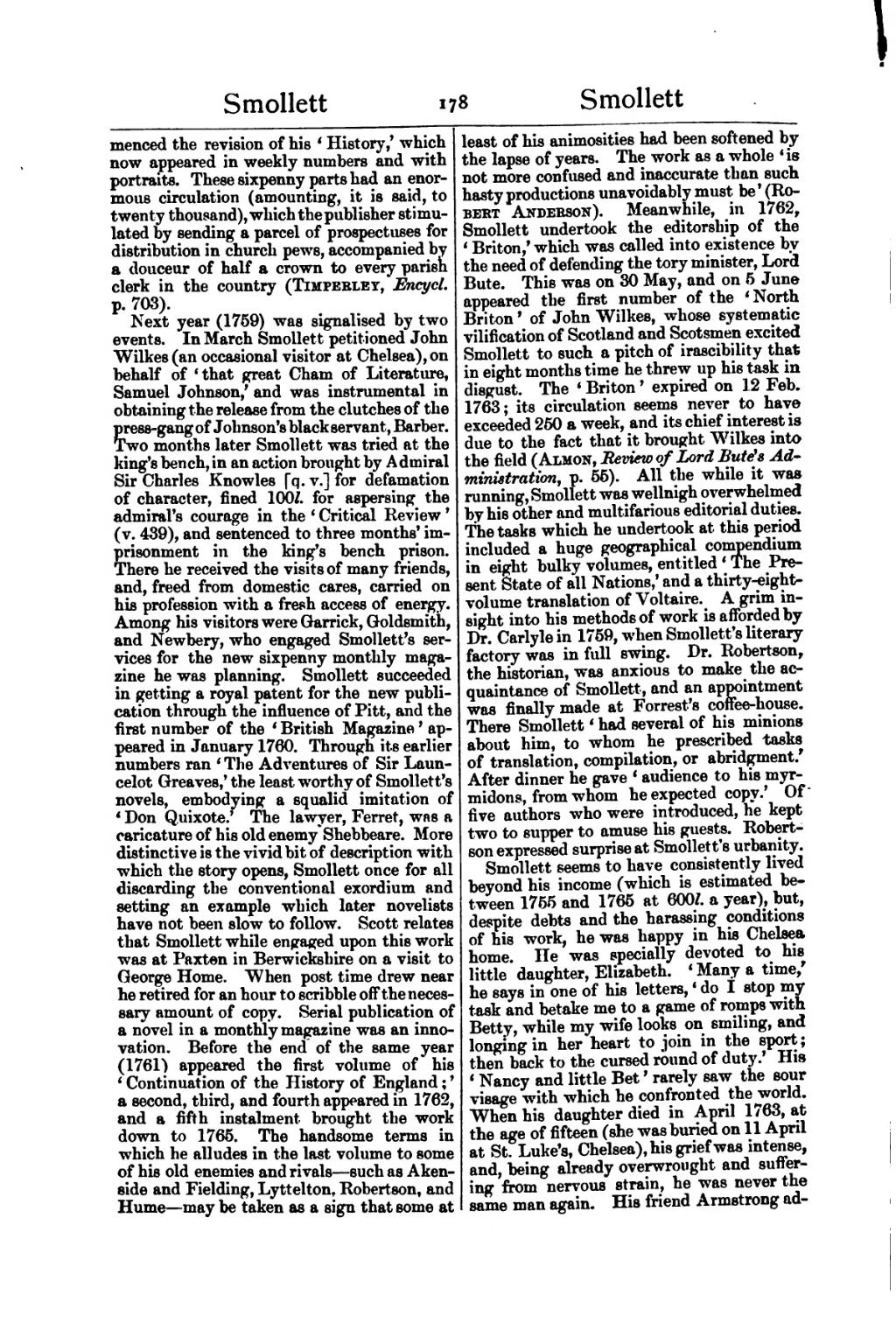menced the revision of his ‘History,’ which now appeared in weekly numbers and with portraits. These sixpenny parts had an enormous circulation (amounting, it is said, to twenty thousand), which the publisher stimulated by sending a parcel of prospectuses for distribution in church pews, accompanied by a douceur of half a crown to every parish clerk in the country (Timperley, Encycl. p. 703).
Next year (1759) was signalised by two events. In March Smollett petitioned John Wilkes (an occasional visitor at Chelsea), on behalf of ‘that great Cham of Literature, Samuel Johnson,’ and was instrumental in obtaining the release from the clutches of the press-gang of Johnson's black servant, Barber. Two months later Smollett was tried at the king's bench, in an action brought by Admiral Sir Charles Knowles [q. v.] for defamation of character, fined 100l. for aspersing the admiral's courage in the ‘Critical Review’ (v. 439), and sentenced to three months' imprisonment in the king's bench prison. There he received the visits of many friends, and, freed from domestic cares, carried on his profession with a fresh access of energy. Among his visitors were Garrick, Goldsmith, and Newbery, who engaged Smollett's services for the new sixpenny monthly magazine he was planning. Smollett succeeded in getting a royal patent for the new publication through the influence of Pitt, and the first number of the ‘British Magazine’ appeared in January 1760. Through its earlier numbers ran ‘The Adventures of Sir Launcelot Greaves,’ the least worthy of Smollett's novels, embodying a squalid imitation of ‘Don Quixote.’ The lawyer, Ferret, was a caricature of his old enemy Shebbeare. More distinctive is the vivid bit of description with which the story opens, Smollett once for all discarding the conventional exordium and setting an example which later novelists have not been slow to follow. Scott relates that Smollett while engaged upon this work was at Paxton in Berwickshire on a visit to George Home. When post time drew near he retired for an hour to scribble off the necessary amount of copy. Serial publication of a novel in a monthly magazine was an innovation. Before the end of the same year (1761) appeared the first volume of his ‘Continuation of the History of England;’ a second, third, and fourth appeared in 1762, and a fifth instalment brought the work down to 1765. The handsome terms in which he alludes in the last volume to some of his old enemies and rivals—such as Akenside and Fielding, Lyttelton, Robertson, and Hume—may be taken as a sign that some at least of his animosities had been softened by the lapse of years. The work as a whole ‘is not more confused and inaccurate than such hasty productions unavoidably must be’ (Robert Anderson). Meanwhile, in 1762, Smollett undertook the editorship of the ‘Briton,’ which was called into existence by the need of defending the tory minister, Lord Bute. This was on 30 May, and on 5 June appeared the first number of the ‘North Briton’ of John Wilkes, whose systematic vilification of Scotland and Scotsmen excited Smollett to such a pitch of irascibility that in eight months time he threw up his task in disgust. The ‘Briton’ expired on 12 Feb. 1763; its circulation seems never to have exceeded 250 a week, and its chief interest is due to the fact that it brought Wilkes into the field (Almon, Review of Lord Bute's Administration, p. 55). All the while it was running, Smollett was wellnigh overwhelmed by his other and multifarious editorial duties. The tasks which he undertook at this period included a huge geographical compendium in eight bulky volumes, entitled ‘The Present State of all Nations,’ and a thirty-eight-volume translation of Voltaire. A grim insight into his methods of work is afforded by Dr. Carlyle in 1759, when Smollett's literary factory was in full swing. Dr. Robertson, the historian, was anxious to make the acquaintance of Smollett, and an appointment was finally made at Forrest's coffee-house. There Smollett ‘had several of his minions about him, to whom he prescribed tasks of translation, compilation, or abridgment.’ After dinner he gave ‘audience to his myrmidons, from whom he expected copy.’ Of five authors who were introduced, he kept two to supper to amuse his guests. Robertson expressed surprise at Smollett's urbanity.
Smollett seems to have consistently lived beyond his income (which is estimated between 1755 and 1765 at 600l. a year), but, despite debts and the harassing conditions of his work, he was happy in his Chelsea home. He was specially devoted to his little daughter, Elizabeth. ‘Many a time,’ he says in one of his letters, ‘do I stop my task and betake me to a game of romps with Betty, while my wife looks on smiling, and longing in her heart to join in the sport; then back to the cursed round of duty.’ His ‘Nancy and little Bet’ rarely saw the sour visage with which he confronted the world. When his daughter died in April 1763, at the age of fifteen (she was buried on 11 April at St. Luke's, Chelsea), his grief was intense, and, being already overwrought and suffering from nervous strain, he was never the same man again. His friend Armstrong ad-
